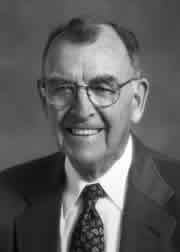

|

|
IN MEMORIAM
Peter C. Kennedy
Professor Emeritus of Veterinary
Pathology, Microbiology & Immunology
UC Davis
1923 – 2006
It is with deep personal sadness that I announce the death of Peter C. Kennedy, August 2, 2006. Dr. Kennedy was an icon in the profession, one of a generation of true American Heroes, and a genuine and kindly man who mentored many and inspired all who knew him. His life was one of dedication to his family, the profession of veterinary medicine, the discipline of veterinary pathology and the University of California, Davis.
A California native, Kennedy was a sophomore at UC Davis when World War II interrupted his studies. He served with distinction as a fighter pilot in the European Theatre. After the war, he returned home to resume his education and received his D.V.M. degree from Kansas State University in 1949. An internship took him to Boston’s Angell Memorial Animal Hospital after which he pursued graduate studies in pathology at Cornell University, receiving his Ph.D. in 1953. Following graduate training, Dr. Kennedy joined Drs. Donald Cordy and Jack Moulton to found the Department of Pathology at the new School of Veterinary Medicine at the University of California, Davis.
Dr. Kennedy’s research career developed and expanded basic knowledge of fetal and endocrine pathology. He was instrumental in identifying the importance of the fetal ruminant pituitary adrenal-axis as the triggering mechanism for parturition. He also helped define the morphological and endocrine factors involved with prolonged gestation in ruminants. His work with infectious causes of abortion characterized lesions in fetal calves caused by infectious bovine rhinotracheitis virus and defined the pathologic criteria of epizootic bovine abortion, a disease of great economic importance to California ranchers. The later disease proved a career long challenge from his first description in 1960 to his involvement in the 2002 and 2006 publications describing a bacterial agent and demonstrating experimental reproduction of the disease. His scholarly achievements led to a NATO Post Doctoral Fellowship in 1960 and a Fulbright-hays Fellowship in 1968. He also served with distinction as a consultant to the United Nations Food and Agriculture Organization and as president of the American College of Veterinary Pathologists. He was honored as a distinguished member of the college in 1989.
Dr. Kennedy was also a consummate diagnostician who recognized many diseases now considered classic in Veterinary Pathology. He was first to describe Hemophilus agni septicemia as a fatal disease in sheep and to associate Hemophilus somnus with infectious meningoencephalitis in cattle. Other classic syndromes he described include Boxer colitis, insulin producing pancreatic endocrine tumors, cerebellar hypoplasia in horses, behavioral changes associated with ovarian tumors in mares, and ram epididymitis. The breadth of his contributions to veterinary pathology is best exemplified by his authorship, with Kenneth V. Jubb, of the classic textbook Pathology of Domestic Animals. The 1000 page two volume first edition was published in 1963. Currently undergoing its 5th revision, this encyclopedic text remains in daily use in pathology laboratories throughout veterinary medicine. Its rich descriptions make it a constant companion of veterinary pathologists studying for their certification exam.
Dr. Kennedy served as chief of service of the Veterinary Medical Teaching Hospital’s Pathology Service from its inception in 1969 to 1981. Under his leadership, the hospital’s pathology program expanded in size and scope to the point where it ranked as one of the best in the world. As service chief, he was sensitive to the importance of the clinical teaching program and consistently maintained the fine balance necessary to meet both the hospital’s diagnostic needs and the student’s educational requirements. When Dr. Kennedy stepped down as chief of service in 1981, he was awarded the Golden Boot Award (literally, rubber boots spray painted gold) by residents and graduate students to recognize his outstanding clinical teaching and mentorship in anatomic pathology. In 1990, he was awarded an unprecedented second Golden Boot Award for continued meritorious service.
After his retirement in 1993, Dr. Kennedy and his wife Irene continued their enjoyment of travel and a search for fine wine and edible wild mushrooms, a unique Peter Kennedy expertise. While they were able to spend considerable time at their family home in Carmel by the Sea, Dr. Kennedy remained active in investigative pathology and resident and graduate student training through regular participation in the program’s weekly gross rounds and surgical biopsy conference. At biopsy conference, he could be counted on for an experienced skepticism of the latest fad in diagnosis balanced by a currency of understanding of the recent literature in the principles of disease. His eloquent expositions on the intricacies of reproductive anomalies and disease remained state of the art reviews for resident education. He continued as a venerable presence through his last illness and after his death, the conference room was distinguished by an empty chair facing a bouquet of roses overlying a tattered brown and well-read volume of Jubb and Kennedy.
In lieu of flowers, the Kennedy family requests that memorial contributions be made to the Peter C. Kennedy Endowed Fellowship c/o Dean's Office School of Veterinary Medicine UC Davis, Davis, CA 95616
Dennis W. Wilson
N. James MacLachlan